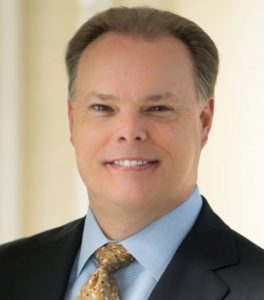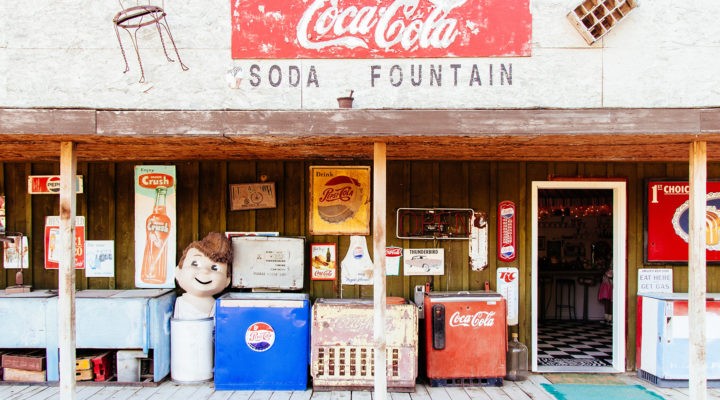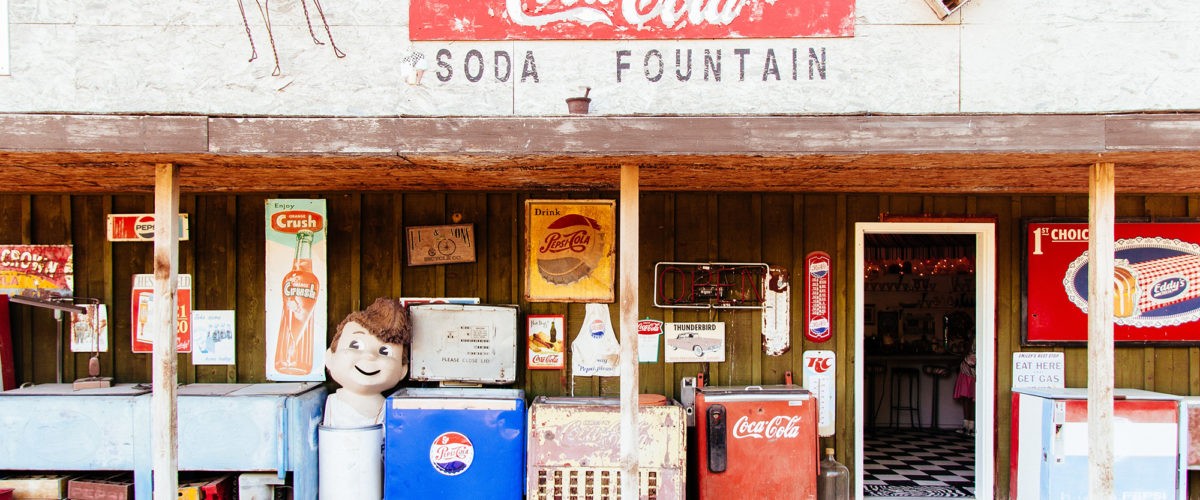“Pastor, I just don’t understand how we got here.”
Now if you feel like you just dropped in on a conversation that had already started, that’s understandable. Let me catch you up on a fascinating chat I participated in the other day at my favorite country store. My wife and I had dropped by Bubba-Doo’s on a Saturday morning. Breakfast on that day of any week is an event.
Yes, cars are stopping outside at the gas pumps as usual. Customers are popping into the store part of the operation to pick up convenience items. Make no mistake, though. The center of the local universe is over in the restaurant on Saturday mornings. Somehow, the feeling is that the entire community manages to gather there at once.

Charles Qualls
On Saturdays there are both Stephanie and Marleen, as well as whoever else may be working that day, whirling around at full speed. Seating is first-come, first-served. There are times when a booth, table or even a stray seat up at the bar is not to be found.
People seem to linger and visit. Fewer people are on a hard schedule on that day. So, conversations tend to be longer. On this particular day, we couldn’t even get a booth like we prefer. So, we took a table.
There is a fascinating thing that happens in the mornings at breakfast time. There will be a table of old men who have convened. You don’t have to sit down with them to know what is happening. If you overhear just a little, you’ll find they are reminiscing about a time they perceive to have been better.
But here is why I say this is fascinating. You’ll catch just a few sentences and guess that these guys are old friends. People who know each other from way back. But if you ask any one of them later, occasionally you’ll find out that not many of them knew each other until just then. Somehow, they all found each other right then and started talking.
“As a pastor of a purple church, I have to be careful what kind of conversations I participate in.”
As a pastor of a purple church, I have to be careful what kind of conversations I participate in. Some fellow pastors would disagree. Of course, many of them have bumpy career paths in ministry.
The rest of us choose a prudent path so we can remain eligible to serve as honorably and faithfully as we can. So, what is a purple church, you ask?
In current American politics, you may recall that one political party is known as the blue party. The other is the red party. When you mix red and blue together, you come up with some hue of purple. There is an actual church out in Oklahoma that has for some time been known as The Purple Church. People think it’s haunted. That is not what we refer to here, though.
Today, describing one’s church as “purple” acknowledges that your membership is made up of people whose voting and ideology fall on both sides of the political aisle. In the church I serve, I have both Biden-voting Democrats and Trump-loving Republicans. They are family with one another.
They sit together in the same pews, and they worship the same God. When it’s mission time, they’ll roll up their sleeves and work together. Friday or Saturday nights may find them out to dinner together. It’s just that they seem to view electoral politics, as well as some attendant cultural matters, differently from each other.
How that can be, at times, I admit confuses me. The longer I try to work it all out in my brain, the more my head hurts.
Do I not have my own political, cultural and societal convictions? Sure, but in the real world and in the church world — yes, the two should of course be the same — this is the way things work. So, I serve a purple church. For 150 years, they’ve been a purple church and didn’t really know it. Somehow, for the sake of friendship and love, they check all those differences at the door.
On this Saturday, the two of us sat at a table that really would hold four. That worked out well, as soon a couple from our church walked in and asked if they could join. Being that the tables at Bubba-Doo’s are pretty close together, sometimes a multi-table conversation can brew up faster than the coffee.
Eventually, as one issue led to another, the subject became how divided we are as a nation currently. For the empathetic and thoughtful, this is a larger picture concern no matter which side of the aisle you might typically vote on. This really should be an even bigger concern, perhaps, than any one issue of the moment.
That’s where the earlier remark was made. “Pastor, I just don’t understand how we got here.” If you think my participation in this conversation is complex, you’d be right. My job, should I choose to do so, is to participate helpfully and not hurtfully.
Also, my charge is to model Christ always. As well, it’s to try and help others apply the gospel to our living. All without tipping my hand, because everyone in leadership has charged me with remaining apolitical when it comes to partisan matters.
“If I were working with our nation like I’d work with a typical couple who’ve been married several years,” I said, “one thing I might point out is that we’ve become competitors. Maybe for some stretches of our national history we were lovers. But right now, we’re in competition with each other.”
“Tell us more about that,” one woman remarked.
“In the beginning, I think our independence from England was a relative unifier,” I explained. “We were lovers as a nation. You get the metaphor? We held fighting for our own independence as such a unifying task that people who weren’t all just alike sure gave the appearance of being.”
“We were unified by the conviction that the state should never control the people using an alliance with religion.”
I continued on. “Take the issue of separation of church and state. You’ll hear people now, more than 200 years later, say we were born a Christian nation. But look back and read. Check into it. I’m not so sure that was true. But we were unified by the conviction that the state should never control the people using an alliance with religion.
“So, they were lovers around that issue. It was foundational, though, on the ground you would have already had a variety of beliefs. And people who were proudly of no faith at all.”
“OK, pastor. Let me have a try,” a fellow named Mark said. “Let’s take the Civil War,” he said. “We divided up mostly around the issue of slavery, and became competitors? We almost broke apart the marriage right then.”
People nodded. Someone else chimed in, “But along comes World War I, the Great Depression and World War II. The Cold War. Every time we were about to get complacent and start to clash over our differences, something monumental would come along and unite us. Right?”
I said, “It’s not to suggest there was perfect unity. Has there ever been? But yes. We’ve had periods of competition and the marriage we call Democracy got tested. Then, we had periods of unity or ‘love’ where the marriage pulled together.”
It’s not a perfect analogy. But that seemed to work for our purposes around the tables on a Saturday morning at Bubba-Doo’s. Things continued on.
“I’m just scared of how fragile our nation and our democracy feels right now,” my wife said. “It feels like a dangerous, contentious time. It kinda keeps you on edge.”
“Oh, I tell you social media is a hot mess right now,” Stephanie added. She had stopped by to top off coffee mugs. “Arguments start up over nothing. You can post something on there that’s not intended to be political at all. Someone goes there to the political place … and poof! The whole thing goes up in flames.”
“For that matter, I can read the words of Jesus in church and be afraid someone may think I’m being political.”
I added, “For that matter, I can read the words of Jesus in church and be afraid someone may think I’m being political.”
Shirley was at one of the nearby tables and participated with us. She said, “We’re paying a high price for all this divisiveness. I don’t think it’s worth it.”
Another person echoed, “That’s what worries me most. What kind of world are we setting up for our children? What kind of example are we setting for the world?”
About that time, I looked around and realized that fully a dozen people were leaning forward from about four surrounding tables. We had ourselves a legitimate coffee klatch that had begun so accidentally.
“So pastor,” I heard the familiar, high-pitched voice of Fred speak up from out of the group. “How do we get out of this mess?”
“Fred, I wish I knew,” I confessed. “But let’s talk about some things we all ought to be able to agree on. You know, in an ideal world.”
“Alright, lay ’em on us,” Billy said. I’m not even sure I realized Billy had come over and joined the conversation. But there he was.
“I dream of a world where truth is valued,” I began. “That’s actual, verifiable truth and data. Not opinions that just get passed around and are mimicked until people think they are truth. But that would mean we would have to agree on valid — and yes, some invalid — sources. I’m not sure we’ll get there.”
“Man, Pastor. That shouldn’t be tough at all,” Billy said.
“Yet it is, Billy” I replied. He nodded.
“What if, as Americans living in a democracy, we all agreed that the rule of law actually mattered?”
“Let me try another one,” I continued. “What if, as Americans living in a democracy, we all agreed that the rule of law actually mattered?”
“Well, don’t we now?” someone asked.
“Looking out the windshield, it seems to me we have folks who think it matters when their party isn’t in office. But maybe not as much so when their party has the power.”
My wife shot me a glance. The glance that said I had my toes right up against the line and I should be careful. She was right. But I still hadn’t assigned a party name, blue or red, as to who might hold that stance. I was staying as neutral as I could.
“Yeah, that one happens a lot. You’re right about that, if we’re being honest” Shirley said.
“Here’s a big one,” I offered. “Using the marriage or family metaphor, let me tell you all a story.”
Here is what I told them. With no names attached, I let them in on separate experiences I’d had. Actually, I had the same basic conversation twice with mothers who didn’t even live in the same state. One was a church member who came to see me years ago. Another was a friend from way back who called me on the phone more recently.
In both cases, a child was coming out with regard to some gender identity or sexual orientation news. The families, so traditional in their cultures and histories, would be jolted in each case.
In each situation, the mothers were seeking my counsel. They were grieving something. They also were nervous and uncomfortable about how they, and others in the immediate family, would absorb the news. Both were clear, though, that “fixing” their child was not their need. That wasn’t their response nor their issue. They were simply struggling to adapt and to accept.
“What you do early in this will determine whether there remains closeness, or whether there is distance between you and your child,” I had told both. Then, I asked in each case, ‘What is there that is so important to you that you would break your relationship with your child?’”
“Well, how did they respond, Pastor?” one of the group asked now.
“In both cases, these mothers stopped in their tracks. It wasn’t that what caused their visceral reactions had gone away. This was all still going to be complicated within their families. What their children were telling them was a lot for them to reckon with. But that question I asked in each case acted like a reset button of sorts. It got their attention.
“What is there that is so important to you that in 10 years you would be willing not to have a relationship with your child?”
“So I posed to both of them a different version of the same question: What is there that is so important to you that in 10 years you would be willing not to have a relationship with your child?”
Now people at the four tables were listening for the outcome in the stories. I thought Fred would spill his Pepsi right out onto his advertisement placemat.
I offered that both mothers in these conversations thought for a minute and both had agreed there was absolutely nothing worth that. There was no opinion, no bias, no difference they would be willing to allow to cause a barrier such that they would have no relationship with their child in one year, much less in 10.
“I’m not saying there are any easy answers for our country. Obviously, there are not. But people right now don’t seem to care how damaging these differences are even to old, longtime friendships. People are too willing to break fellowship,” I observed.
“That’s why I think we’re living more as competitors than we are as lovers, collectively right now. Until we decide there’s nothing worth breaking up the marriage, America will continue to be a contentious place.”
Billy chimed in, “Yeah, and if we don’t hurry up and decide that soon I’m afraid America will get a divorce.” Several people agreed.
Colorful public theologian Nadia Bolz-Weber has spoken these wise words. I think they apply. She says: “And this is it. This is the life we get here on earth. We get to give away what we receive. We get to believe in each other. We get to forgive and be forgiven. We get to love imperfectly. And we never know what effect it will have for years to come. And all of it … all of it is completely worth it.”
We didn’t solve any problems that day at Bubba-Doo’s. But we sure did manage to have a conversation about why having these kinds of conversations can be so rough. Now that I think about it, maybe we did at least learn something.
There was tremendous diversity around the tables that morning. Like my church, there were Biden-voting Democrats and Trump-loving Republicans present in the conversation. Yet no one had misbehaved. No one lost their temper. We agreed that nothing was worth breaking the whole country up over.
Actually, that morning at least, we seemed to demonstrate that there’s nothing worth spoiling the fellowship one could find on any given Saturday at a big country store restaurant.
Charles Qualls serves as pastor of Franklin Baptist Church in Franklin, Va. He is the author of eight books.
Articles in the Bubba-Doo’s series:
A thoughtful question at Bubba-Doo’s
A Bubba-Doo’s regular loses a loved one
An internet celebrity visits Bubba-Doo’s
Bubba-Doo’s: A behind-the-scenes look inside the stories
A dose of clinical grief from Stumpy at Bubba-Doo’s
Intrigue visits a booth at Bubba-Doo’s
A Christmas lesson at Bubba-Doo’s
A chat with Mickey at Bubba-Doo’s about whether I preach the gospel or not


